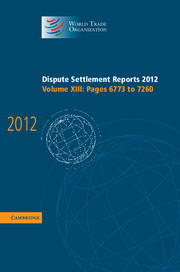Book contents
- Frontmatter
- Contents
- Dominican Republic - Safeguard Measures on Imports of Polypropylene Bags and Tubular Fabric (WT/DS415, WT/DS416, WT/DS417, WT/DS418): Reports of the Panel
- United States - Anti-Dumping Measures on Certain Shrimp and Diamond Sawblades from China (WT/DS422): Report of the Panel
- United States - Certain Country of Origin Labelling (COOL) Requirements (WT/DS384/24, WT/DS386/23): Award of the Arbitrator
- Cumulative List of Published Disputes
United States - Certain Country of Origin Labelling (COOL) Requirements (WT/DS384/24, WT/DS386/23): Award of the Arbitrator
Published online by Cambridge University Press: 12 December 2017
- Frontmatter
- Contents
- Dominican Republic - Safeguard Measures on Imports of Polypropylene Bags and Tubular Fabric (WT/DS415, WT/DS416, WT/DS417, WT/DS418): Reports of the Panel
- United States - Anti-Dumping Measures on Certain Shrimp and Diamond Sawblades from China (WT/DS422): Report of the Panel
- United States - Certain Country of Origin Labelling (COOL) Requirements (WT/DS384/24, WT/DS386/23): Award of the Arbitrator
- Cumulative List of Published Disputes
Summary
INTRODUCTION
This arbitration under Article 21.3(c) of the Understanding on Rules and Procedures Governing the Settlement of Disputes (the “DSU”) concerns the “reasonable period of time” for the implementation of the recommendations and rulings of the Dispute Settlement Body (the “DSB”) in the disputes United States – Certain Country of Origin Labelling (COOL) Requirements. These disputes concern certain US country of origin labelling (“COOL”) requirements for beef and pork when sold at the retail level.
On 23 July 2012, the DSB adopted the Appellate Body Reports and the Panel Reports, as modified by the Appellate Body Reports, in United States – Certain Country of Origin Labelling (COOL) Requirements. The Panel and Appellate Body Reports found the “COOL measure” (comprising the “COOL statute” passed by the US Congress, and its implementing regulation, the “2009 Final Rule” issued by the US Department of Agriculture (the “USDA”)), particularly in regard to the muscle cut meat labels, to be inconsistent with Article 2.1 of the Agreement on Technical Barriers to Trade (the “TBT Agreement”) because it accords less favourable treatment to imported livestock than to like domestic livestock. The Panel found the Vilsack letter to be inconsistent with Article X:3(a) of the General Agreement on Tariffs and Trade 1994 (the “GATT 1994”). The Panel and the Appellate Body recommended that the DSB request the United States to bring its measures into conformity with its WTO obligations.
In a letter addressed to the Chairman of the DSB, dated 21 August 2012, and at the meeting of the DSB held on 31 August 2012, the United States signalled its intention to implement the recommendations and rulings of the DSB, and stated that it would require a reasonable period of time to do so.
On 13 September 2012, Canada and Mexico informed the DSB that consultations with the United States had not resulted in an agreement on the reasonable period of time for implementation. Canada and Mexico therefore requested that such period be determined through arbitration pursuant to Article 21.3(c) of the DSU. Since the two disputes were examined by the same panel and by the same Division of the Appellate Body, both Canada and Mexico asked that their requests pursuant to Article 21.3(c) of the DSU be dealt with by the same arbitrator in joint proceedings.
- Type
- Chapter
- Information
- Dispute Settlement Reports 2012 , pp. 7173 - 7236Publisher: Cambridge University PressPrint publication year: 2014
- 5
- Cited by



